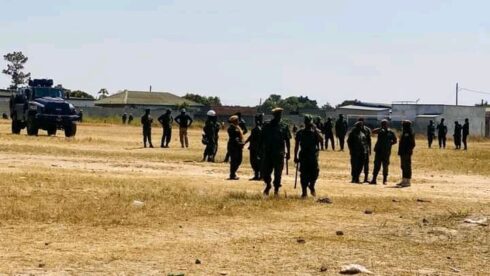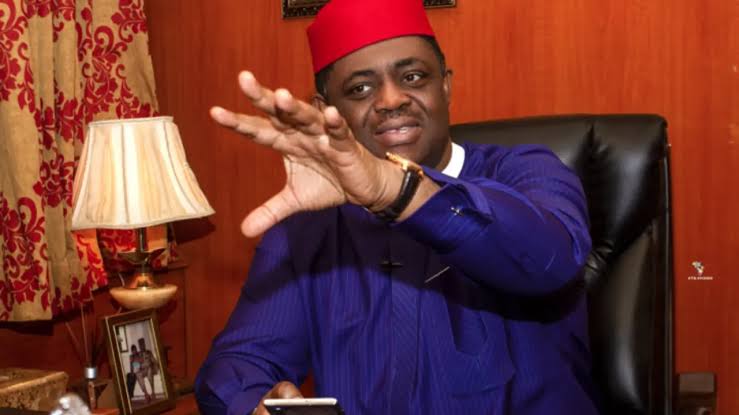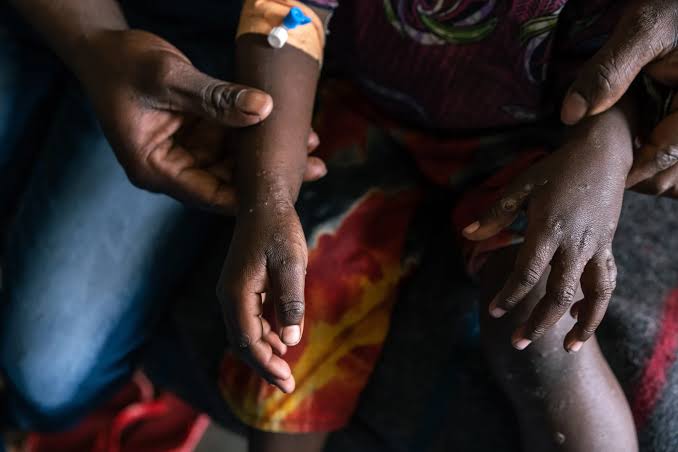Metro
Uncertainties in the season of Zambia’s digital rights pursuits
Published
5 months agoon
By
Isaac Dachen
Upholding the rule of law is fundamental to protecting human rights and dignity, ensuring justice and equality for all and promoting stability, security, and predictability.
It is also crucial for fostering economic growth and development, preventing abuse of power and corruption, and maintaining social order and cohesion.
President Hakainde Hichilema, in his inaugural speech in August 2021, pledged to restore the rule of law in Zambia, promising a departure from the country’s past governance challenges.
“We will restore the rule of law, general order in our public places and communities, and return our country back to normalcy. Read my lips, no more cadreism from any political party,” he said.
“There is space for all of you, but no space for thuggery, no space for violence. It is a new dawn for the country going forward.”
However, concerns have since emerged over the state of the rule of law in Zambia.
Issues such as the executive’s significant influence over the judiciary and legislature, judicial appointments and decision-making have raised questions about the independence of the courts.
Opposition parties continue to criticise laws like the Public Order Act and the Cyber Security Act, which they argue restrict free speech and assembly.
Several opposition parties, including the New Heritage Party and the Socialist Party, have been denied police permits to hold public rallies.
While some rallies, such as those by the United Kwacha Alliance and Citizens First party, were initially blocked, they were eventually allowed to proceed after intervention.
Opposition leaders, including former President Edgar Lungu and Socialist Party leader Dr. Fred M’membe, have voiced concerns about what they see as a shrinking space for political engagement and expression.
Civil society organizations, including ActionAid, the Non-Governmental Gender Organizations Coordinating Council (NGOCC), the Alliance for Community Action, and Chapter One Foundation, have expressed alarm over what they describe as a “shrinking space for freedom of expression and assembly.”
In a joint statement, 13 civil society organizations noted a “growing intolerance for dissent,” citing recent failures by public authorities to protect these fundamental democratic rights.
Despite these concerns, the government has maintained that Zambia’s democratic space is not shrinking.
Justice Minister Mulambo Haimbe, speaking on ZNBC TV’s Sunday Interview, stated that the current administration, in office for just over two years, is not perfect but is committed to maintaining democratic freedoms.
“We are not professing perfection; there are bound to be mistakes. However, that cannot equate to a shrinking democratic space,” Haimbe argued.
Veteran politician Vernon Johnson Mwaanga echoed this sentiment, dismissing opposition claims and asserting that Zambia has faced similar challenges before and will overcome them.
“Citizens will not allow the country to slide back to the old days,” he said. “I don’t accept these concerns because I have seen this country through ups and downs.”
However, critics highlight that free speech rights in Zambia are increasingly under threat, with journalists facing harassment, arrests, and censorship.
The government’s monitoring of online activities through the Cyber Security and Cyber Crimes Act has been another point of contention.
Recently, the Ministry of Science and Technology invoked Section 54, No. 2 of 2021, to combat online hate speech, propaganda, defamation, and child abuse.
Dr. Brilliant Habeenzu, Permanent Secretary at the Ministry, warned that the government is investing heavily in cyber infrastructure to track down and prosecute online offenders.
Public gatherings and protests are often dispersed or banned, with citizens and media outlets frequently hesitating to express dissenting views.
Stakeholders are calling for judicial reforms to enhance judicial independence and impartiality, repeal or amend restrictive laws, reduce executive influence, and protect journalists from harassment and intimidation.
By addressing these challenges, Zambia can strengthen the rule of law and expand free speech rights, enabling citizens to freely express themselves and hold those in power accountable.
This story is sponsored by Project Aliyense.
You may like
-


Zambia announces second case of Mpox as country battles cholera outbreak
-


Zambian NGOs rate President Hichilema’s reforms as not far-reaching
-


Zambian drug agency declares ex-President Lungu’s daughter wanted
-


Facebook returns to Uganda after 4-year ban
-


Zambian NGO decries persistent corruption, says governance in 2024 marked by mixed fortunes
-


Zambia: Expert warns of food security threat due to climate change
Metro
‘Don’t start what you can’t finish’, ex-Nigerian official replies President Tchiani
Published
3 weeks agoon
December 29, 2024
Former Nigerian Aviation Minister, Femi Fani-Kayode, has told President Abdourahamane Tchiani of Niger Republic to refrain from making infantile and puerile allegations that Nigeria is conniving with France and the Lakurawa terrorists to destabilize his country.
Tchiani had, during an interview with Radio-Télévision du Niger on December 25, accused the Nigerian government of using the sect, with the help of foreign security forces notably from France, to wreck havoc in his country, insinuating that President Bola Tinubu had been paid by the France government to allow their military to establish a base in Borno State.
He also alleged that Nigeria, acting in collaboration with the French government and the terrorist group, was responsible for an attack on the Niger-Benin oil pipeline on December 13, 2024, in Gaya, Dosso Region of Niger Republic.
But in a statement he posted on his official X handle on Sunday, Fani-Kayode who is popularly called FFK, said Nigeria does not need the help of France and thr Lakurawa terrorist to destabilize Niger Republic.
FFK insisted that Nigeria is not part of the western powers sponsoring terrorists organizations to wretch havoc on the West African sub region.
“If Nigeria wanted to destabilise Niger Republic, I do not believe that we would need France or any terrorist organisation to do so,” the politician wrote.
He noted that on the contrary, western powers are the ones behind terrorist organizations operating in the region and other parts of Africa.
“I have maintained that the western powers are behind the terrorist groups that have plagued the West African sub region over the last 15 years and for the last ten years I have publicly stated this and given my reasons.
“I am equally certain that Nigeria, being one of the major victims of these terrorist organisations, has had no part in it and that no Nigerian President, past or present, has indulged in such grave and dangerous actions.”
He went on to advice Tchiani against provoking Nigeria with unguarded and infantile utterances capable of stoking Nigeria against his country.
“The Nigerien Military Head of State, Abdourahamane Tchiani, would do well to be careful not to provoke our wrath with his absurd assertions and remain mindful of the fact that the defence budget for his country, Mali and Burkina Faso COMBINED is not up to 25% of Nigeria’s.
“Tchiani’s grave allegations that President Tinubu and NSA Nuhu Ribadu have been bought by the French to destabilise Niger Republic, that our Government is jointly sponsoring a terrorist group with France to do same and that there are French military bases in Nigeria are infantile, puerile, mendacious and asinine.
“It is a squalid attempt by the Nigerien Head of State to sow the seeds of dissention in our country, to alienate our people from constituted authority, to divide our people and to undermine the Tinubu administration,” he added.
“It is also highly provocative and the FG should consider the possibility of taking other more extreeme measures if this reckless provocation continues.
“We are under no obligation to show restraint when we are being undermined and maligned.
Metro
Zambia announces second case of Mpox as country battles cholera outbreak
Published
4 weeks agoon
December 28, 2024
The Zambian Ministry of Health has reported a second case of Monkeypox, popularly known as Mpox, in Kitwe region of Copperbelt Province.
Acting Health Minister, Douglas Syakalima, who made the announcement on Friday during a press conference in Lusaka, revealed that the Ministry is intensifying contact tracing and surveillance to curb further spread of the disease.
Syakalima who also addressed the ongoing cholera outbreak in Nakonde, Muchinga Province, said thus far, seven cases have been confirmed.
“The second Mpox case involves a 34-year-old female from Ndeke, Kitwe, who presented with symptoms including rash, fever, swollen lymph nodes, and oral ulcers on December 21,” Syakalima said at the press parley.
He noted that there was an initial misdiagnosis with chickenpox in Lumwana, North-Western Province, but laboratory tests on December 26 confirmed that it was Mpox.
Syakalima added that the patient’s husband, who works in a neighboring country with confirmed Mpox cases, had experienced similar symptoms earlier this month.
“Both patients are now stable and under close monitoring. A rapid response team has been deployed to trace contacts and prevent further spread,” he said, adding that eight close contacts of the couple are currently under observation, while nationwide surveillance has been heightened.
The Health Minister added that on December 26, five cholera cases were confirmed at Nakonde Urban Clinic with the first three patients, a husband, wife, and their son, admitted on December 24 with symptoms of diarrhea, vomiting, dehydration, and shock.
“Today, two more cases have been reported, bringing the total to seven confirmed cholera cases from the same household,” Syakalima stated.
He explained that Nakonde’s location as a border town with high cross-border movement poses a risk for the disease to spread to other parts of the country.
The Minister however, assured that the Ministry has deployed teams to trace contacts, chlorinate water sources, disinfect affected homes, and activate Incident Management Systems at district and provincial levels while surveillance has been heightened, and contact tracing is ongoing for 33 individuals.
“The government remains committed to preventing further spread of these diseases,” Syakalima assured.
EDITOR’S PICK


Nigeria: Marketers predict further price cut as another refinery begins operations
Oil marketers and the Nigerian Midstream and Downstream Petroleum Regulatory Authority expect refined petroleum product prices to reduce as another...


Kenya: Consumer inflation rises to 3.0% from 2.8%
Kenya’s statistics agency said on Tuesday that Kenya’s consumer price inflation increased slightly to 3.0% year-over-year in December from 2.8%...


South Africa’s Transnet’s half-year deficit hits $117m
Transnet, a state-owned logistics company in South Africa, announced on Tuesday that it had lost 2.2 billion rand ($117.48 million)...


Nigeria, China extend $2bn currency swap deal
A 15 billion yuan ($2 billion) currency-swap arrangement between China and Nigeria has been extended to boost investment and commerce...


Egypt’s central bank maintains overnight rates
As anticipated, Egypt’s central bank has maintained its overnight interest rates, stating that although inflation was predicted to drop significantly...


Illicit flows cost Nigeria, others $1.6bn daily— AfDB
According to the African Development Bank (AfDB), illicit money flows and profit shifting by multinational corporations doing business in Africa...


‘Don’t start what you can’t finish’, ex-Nigerian official replies President Tchiani
Former Nigerian Aviation Minister, Femi Fani-Kayode, has told President Abdourahamane Tchiani of Niger Republic to refrain from making infantile and...


Again, Starlink raises prices of its services in Nigeria
Elon Musk’s satellite internet service provider, Starlink, has again jacked up the prices of its services in Nigeria after an...


Former President of Moroccan club Raja sentenced to 3 years in prison
The former President of Moroccan top club, Raja Casablanca, Mohamed Aouzal, has been sentenced to three and a half years...


Zambia announces second case of Mpox as country battles cholera outbreak
The Zambian Ministry of Health has reported a second case of Monkeypox, popularly known as Mpox, in Kitwe region of...


